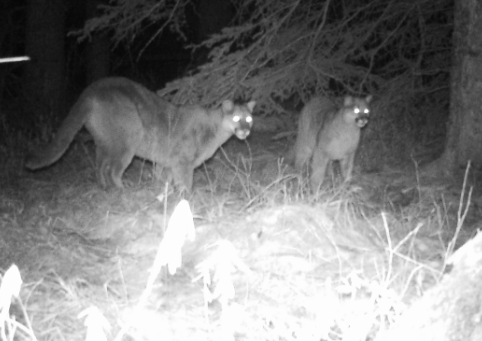BANFF – A third cougar kill near the Banff townsite has prompted a formal warning.
A lone cougar killed a young-of-year elk off Tunnel Mountain Road adjacent to the campground on Friday (Jan. 18). Cougars have also taken down a coyote and a young mule deer close to town in the past three weeks.
Parks Canada also closed an area between Johnson Lake and Cascade Ponds Tuesday (Jan. 23) because a wolf pack is feasting on elk carcass.
Parks Canada wildlife experts say the increased cougar activity is no cause for alarm, but urge people to pay more attention to their surroundings, particularly at dawn and dusk when big cats are most active.
“Yes, there have been kill sites on the edges on town, but the cougars have not been seen in town and the kills have not been in town,” said Dan Rafla, human-wildlife conflict specialist for the Banff National Park.
“The behaviour that they’ve shown is completely normal,” he said, noting the big cats are hunting under the cover of darkness and outside town boundaries.
Attacks on humans are extremely rare. Alberta’s only fatality occurred in 2001, when a cougar killed Canmore’s Frances Frost, 30, as she was cross-country skiing near Lake Minnewanka in Banff National Park.
Cougars are efficient hunters that prey on deer, elk, moose, sheep and other mammals. Solitary and secretive, cougars can be active any time of day, but most often hunt at dusk, night and dawn.
In this latest incident, a dead elk reported alongside Tunnel Mountain Road was initially thought to be have run over and killed by a vehicle.
Rafla said the duty officer who went to investigate spotted drag marks in the snow.
“The young-of-year elk was killed overnight by a cougar and cached, but quite close to the road,” said Rafla.
A decision was made to remove the partially eaten carcass for public safety reasons due to its close proximity to the road, campground, hotels and trails.
Parks put up warning signs in the immediate area and set a motion-activated camera in the area.
“The cougar, as expected, came back that night after dark, but it has not been seen again,” said Rafla, noting it appeared to be a solitary cat in this instance.
Cougars use wildlife corridors near Banff year-round, but increased cougar activity, in part, is being attributed to the concentration of elk and deer in the valley bottom around town in winter.
“There’s a decent snowpack, and by now most of the prey animals are focused in the valley bottoms, which is where the town is,” said Rafla. “Obviously, predators are going to follow”.”
Due to increased cougar activity, permeable rail fences were set up at the underpasses beneath the Trans-Canada Highway on Monday (Jan. 21) in a bid to keep a herd of about 170 elk on the north side of the valley in the Cascade wildlife corridor.
Rafla said the rails allow other animals to move through, but block elk.
“The thought is this will draw those carnivores away to the north side of the highway and have them feed on elk away from townsite,” he said.
A pair of cougars, likely a mother and her offspring, took down a coyote in a forested area near the industrial compound on Jan. 9. It’s believed the same pair of cats killed a young mule deer near the Banff Springs Hotel’s staff accommodation in late December.
In January of last year, a cougar did come into the townsite and was spotted outside Banff IGA by a local Mountie on a routine traffic stop. It was two metres away on the sidewalk from the rookie officer.
The cougar hung around for about 20 seconds before taking off towards Banff Avenue on Elk Street. The cat walked close enough to the Ptarmigan Hotel door sensor to activate the automatic door.
To avoid a cougar encounter, Parks Canada advises people to travel in groups and keep everyone together; be especially cautious when travelling at dawn and dusk; travel slowly if cycling or jogging; make noise to alert a cougar to your presence; carry bear spray in an easily accessible location and know how to use it; keep your dog on leash at all times, and leave the area if you see or smell a dead animal.
Parks also asks that people report any cougar sightings immediately. The number to call is 403-762-1470.




